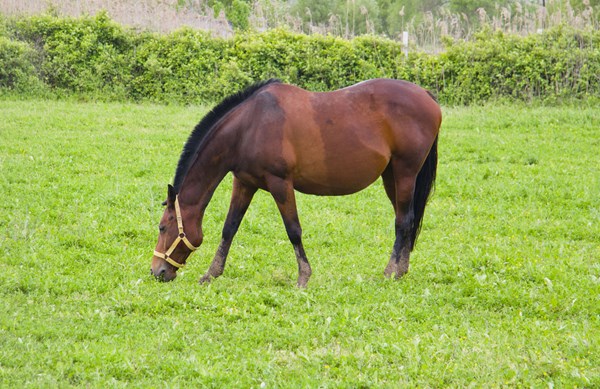 Credit: Thinkstock
Credit: ThinkstockDuring the first eight months of pregnancy, your mare may be fed like any other horse, with a balanced, quality diet. But things are changing rapidly during this last stage of pregnancy: She requires more calories, more protein, more omega 3s, and balanced vitamins and minerals, not only for the unborn foal but also to prepare for milk production. Lactation places huge demands on the mare’s body; proper nutrition will ensure she completes her nursing duties in good health.
Grass hay or pasture should be provided around the clock; she should never run out. If allowed to self-regulate her intake, she will likely consume 2.5% to 3.5% of her body weight as forage. Alfalfa hay should also be included to balance her protein needs. Alfalfa should never be fed exclusively (due to potential mineral imbalances). Strive for a 60:40 ratio of grass hay to alfalfa hay.
The fetus gains 1 pound per day during these final three gestational months. Hay alone will not meet all the mare’s caloric needs. Furthermore, hay is missing many vitamins that would be found in living, fresh grass. A quality commercially fortified feed designed for broodmares will meet her nutritional needs as long as it is fed according to recommended amounts. Or you can mix your own feed by offering beet pulp, hay pellets, ground flaxseeds or Chia seeds, and other whole foods, along with a comprehensive supplement that provides balanced levels of vitamins, and minerals such as copper, zinc, and manganese, as well as selenium and iodine.
These months are also critical to fetal development. Researchers from the University of Florida revealed that foals’ exposure to the omega 3 fatty acid, docosahexaenoic acid (DHA), in utero and early lactation can positively impact cognitive function and learning success. For more on this, read Getty’s Research Reflection, “Omega 3 Supplementation During Pregnancy Improves Learning Ability” or read it on Getty’s website under Research Reflections.
Attention to nutrition will help the mare maintain strength and health in this final stage of pregnancy as well as be ready for the significant demands of milk production and nursing.
Juliet M. Getty, PhD, is an independent equine nutritionist with a wide U.S. and international following. Her research-based approach optimizes equine health by aligning physiology and instincts with correct feeding and nutrition practices. Find useful information for the horseperson at www.GettyEquineNutrition.com. Sign up for Getty’s informative, free e-newsletter, Forage for Thought; browse her library of reference articles; search her nutrition forum; and purchase recordings of her educational teleseminars. Reach Dr. Getty directly at gettyequinenutrition@gmail.com.


